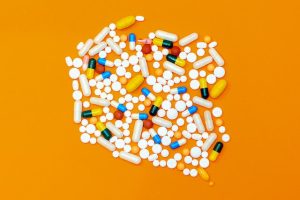Novartis Kymriah for relapsed/refractory follicular lymphoma (FL)
- A Persistent Crisis: The Looming Specter of Drug Shortages in United States
- Rabies: The fatality rate nearly 100% once symptoms appear
- Human Brain Continues to Grow: Study Shows Increase in Size and Complexity
- CRISPR Genome Editing: From Molecular Principles to Therapeutic Applications
- Metformin Helps Immune System Better Recognize Cancer Cells
- Highlights of Prostate Cancer Research at the 2024 EAU Congress
Novartis Kymriah in the treatment of relapsed/refractory follicular lymphoma (FL): long-term follow-up, showing strong and lasting remission!
- Red Yeast Rice Scare Grips Japan: Over 114 Hospitalized and 5 Deaths
- Long COVID Brain Fog: Blood-Brain Barrier Damage and Persistent Inflammation
- FDA has mandated a top-level black box warning for all marketed CAR-T therapies
- Can people with high blood pressure eat peanuts?
- What is the difference between dopamine and dobutamine?
- How long can the patient live after heart stent surgery?
Novartis Kymriah in the treatment of relapsed/refractory follicular lymphoma (FL): long-term follow-up, showing strong and lasting remission!
Novartis recently announced at the 63rd Annual Meeting of the American Society of Hematology (ASH2021) in 2021 the subgroup analysis data of the Phase 2 ELARA study with a median follow-up of 17 months.
The results showed that in high-risk patients with relapsed or refractory follicular lymphoma (r/r FL), CD19 CAR-T cell therapy Kymriah (tisagenlecleucel) showed very high efficacy .
The one-year progression-free survival (PFS) rate was 67%; for patients who achieved complete remission (CR), the one-year PFS rate reached 86%.
Consistent with the preliminary analysis, Kymriah has significant safety. No high-grade cytokine release syndrome (CRS) was reported within 8 weeks of infusion , and no new safety signals were found.
Kymriah is the first CAR-T cell therapy approved by the US FDA. It is currently on the market in 30 countries around the world and has more than 350 certified treatment centers.
Kymriah is a CD19-directed genetically modified autologous T cell immune cell therapy. Unlike conventional small molecule or biological therapies, CAR-T cell therapy is a live T cell therapy product.
The principle of Kymriah is to genetically modify the patient’s T cells to express a chimeric antigen receptor (CAR) designed to target the antigen CD19, which is an antigen protein expressed on the surface of a variety of blood tumor cells, including B cells Lymphoma and leukemia cells.
The results of the subgroup analysis announced at the ASH meeting showed that at a median follow-up of 17 months, Kymriah induced a high rate of durable remission in most subgroups of patients with high-risk diseases whose prognosis is usually poor.
Among the 9 high-risk subgroups analyzed, except for 3 subgroups (disease progression within 2 years [POD24], high total metabolic tumor volume [TMTV], and previous ≥5 lines of therapy), Kymriah is in most patients The complete remission rate (CRR), total remission rate (ORR), and duration of remission (DOR) have all been well maintained.
High and long-lasting remission was observed in the overall population of the ELARA study. A total of 94 patients were evaluated for efficacy, and the median follow-up time was about 17 months.
CRR was 69% (95%CI: 60-78), ORR was 86% (95%CI: 78-92), 12-month progression-free survival (PFS) was 67% (95%CI: 56-76), The 9-month DOR was 76% (95%CI: 65-84).
For patients with complete remission (CR), the 12-month PFS was 86% (95% CI, 74-92), and the estimated DOR rate was 87% (95% CI, 75-93) .
In the safety analysis (n=97), the safety status of Kymriah continued to reflect the significant results of the early ELARA analysis.
Within 8 weeks after infusion, 48% of patients developed cytokine release syndrome (CRS), no patients developed CRS of grade 3 or higher as defined by the Lee scale, and 37% had neurological events (3% ≥ grade 3) , And no treatment-related deaths occurred.
In the ELARA trial, a separate analysis of inpatient and intensive care unit patterns for inpatients and outpatients showed that Kymriah may reduce the utilization of medical resources for outpatients with r/r FL .
Among outpatients (n=17), 35% of patients do not require hospitalization in the first 2 months after infusion; compared with patients receiving inpatient treatment, patients receiving outpatient treatment have a lower median average Length of hospital stay (4 days [n=17] vs 12 days [n=80]).
In addition, compared with inpatients, the average hospitalization cost of outpatients after infusion is significantly lower .
Kymriah is a one-time treatment designed to strengthen the patient’s immune system to fight cancer. Kymriah’s approved indications include:
(1) treatment of relapsed or refractory acute lymphoblastic leukemia (r/r ALL) children and young adults (age to 25 years);
(2) treatment of relapsed or refractory diffuse Adult patients with large B-cell lymphoma (r/r DLBCL).
At present, in the United States and the European Union, Kymriah’s supplementary biological product licensing application (sBLA) and category II changes have been under review: for the treatment of adult patients with r/r FL who have previously received at least 2 therapies. In the United States, the FDA has granted priority review to sBLA.
Previously, the FDA has granted Kymriah the Regenerative Medicine Advanced Therapy (RMAT) designation for the treatment of r/r FL ; the European Commission (EC) has granted Kymriah the Orphan Drug Designation (ODD) for the treatment of FL. If approved, Kymriah will provide an important treatment option for patients with r/r FL.
Meanwhile, r / r FL will become Kymriah third B cells malignant tumor indications.
This new indication application is based on the positive data of the key Phase 2 ELARA trial.
This is a single-arm, multi-center, open-label Phase 2 trial that evaluated the efficacy and safety of Kymriah in the treatment of adult patients with R/R FL.
The main analysis data set of the trial was announced earlier this year at the 2021 American Society of Clinical Oncology (ASCO) annual meeting virtual meeting .
The results showed that the study observed a strong response rate in r/r FL patients who had previously received multiple therapies (median: 4 [range: 2-13]): a complete response rate (CR) of 66 %, the overall response rate (ORR) reached 86%. The safety is very significant. In the first 8 weeks after the infusion, no patient developed Kymriah-related cytokine release syndrome (CRS) of grade 3 or higher.
Novartis Executive Vice President and Global Head of Oncology and Hematology Development Jeff Legos said: “The ability to implement Kymriah in an outpatient setting may reduce the treatment burden on patients and their care teams. Extensive FL data presented at the ASH annual meeting show that Kymriah has Potential to provide transformative results and have a positive impact on the entire healthcare system.”
33
Disclaimer of medicaltrend.org
Important Note: The information provided is for informational purposes only and should not be considered as medical advice.




